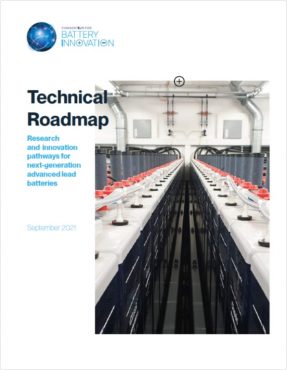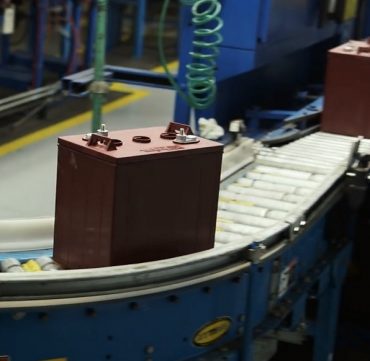Manufacturers and Research Consortium Name 13 Areas to Improve Battery Performance, Deployment and Manufacturing to Meet Demand for Advanced Battery Technology
WASHINGTON – JULY 14, 2021 – As lawmakers work to strengthen infrastructure within the energy sector, batteries have emerged as a critical area that requires additional investment to ensure a reliable source of energy storage to safeguard a secure supply chain to power the electrical grid, as well as essential industries like transportation, telecommunications, data security, aerospace and defense.
The pandemic revealed the nation’s reliance on imports of products and materials used in critical manufacturing sectors to produce energy storage. In response, the U.S. Department of Energy (DOE) publicly committed to further investment to create and sustain American leadership in energy storage.
The lead battery industry, with its reliable and proven domestic infrastructure has developed an innovation roadmap to demonstrate its role in helping DOE meet that challenge. Battery Council International (BCI) and the Consortium for Battery Innovation (CBI) jointly produced the report.
“This roadmap identifies key research areas which offer opportunities for the next generation of advanced lead batteries to deliver significant performance gains and to play and even greater role in the diverse energy mix that will power the nation’s grid. It’s a call to arms for lead battery manufacturers, DOE, and the national laboratories to partner on collaborative research that takes science from the laboratory to the marketplace,” said Roger Miksad, executive vice president of BCI.
The lead battery industry believes that by using the experience of the lead battery industry in combination with the scientific skill and expertise of the DOE’s national lab system can yield significant performance gains that could double, or provide even greater advances to cycle life and energy density. This would further cement lead batteries as the only energy storage solution with intrinsic safety measures, that is highly sustainable, manufactured domestically and meets the technoeconomic needs of the U.S. utility sector for decarbonization and distribution of the U.S. grid.
“DOE’s renewed focus on energy storage R&D represents a unique opportunity for demonstrable gains in the U.S. battery industry. A high-performing and sustainable energy storage solution is key, and this is possible through a collaboration between the U.S. lead battery industry and the scientific excellence of the DOE,” says Dr. Matt Raiford, senior technical manager, CBI, an author of the roadmap.
In February, President Biden issued an Executive Order to ensure resilient and diverse supply chains which put the spotlight on the need for the U.S. to assert global leadership with home-grown technology to assist in the transition to an electric and low carbon future. High capacity batteries will help to enable that process. Advanced lead batteries hold the promise of a truly sustainable, U.S. battery energy storage industry.
The roadmap’s thirteen research work areas identified to aid DOE in meeting the challenge include:
- Lead industry support
- Lead Battery Science Research Program
- Additive modeling
- Bipolar innovation
- Manufacturing
- Technoeconomic analysis
- Pilot manufacturing
- Supply Chain issues
- Logistics
- Balance of plant optimization
- Energy storage system demonstration
- Operational Issues
- Recycling
The U.S. lead battery industry has an annual economic impact of $26.3 billion with more than 92,000 direct and indirect jobs across 38 states. Lead batteries are a baseline energy storage technology used in automotive, telecommunications, electric power, mining, agriculture, marine, and data centers. They are the most recycled product in the world, boasting a 99% recycling rate. Lead batteries provide 60% of the global rechargeable energy storage market, and have significant potential for even better performance to serve increasingly demanding requirements for vehicle electrification and the integration of renewable power to the electric grid.
About Battery Council International
Battery Council International (BCI) is the North American trade association representing the lead-based battery manufacturing, supply, recycling and distribution companies. For more information, visit www.batterycouncil.org.
About The Consortium for Battery Innovation
The Consortium for Battery Innovation (CBI) is a pre-competitive research organization funding research into lead batteries for energy storage, motive and automotive applications.
For more than 25 years, with its membership of battery manufacturers, industry suppliers, research institutes and universities, CBI has delivered cutting-edge research pushing the boundaries of innovation in lead battery technology. Our membership comprises the majority of US-based companies from the entire lead battery value chain.
Through research partnerships with scientific institutions including Argonne National Laboratory and UCLA, CBI is setting the standard for advanced lead batteries and the next generation of energy storage.








